Christ Church Cathedral
Artists: Members of the Accademia de’ Dissonanti – Elinor Frey, cello and direction; Laura Andriani, violin; Rossella Croce, violin; Isaac Chalk, viola; and Jan De Winne, flute
Boccheriniana celebrates one of the most delightful and original voices of the classical era, Luigi Boccherini, alongside European composers from the same era, Mozart, J.C. Bach, and Maddalena Lombardini Sirmen. During this time, now known for its elegant ‘galant’ music, Boccherini championed his instrument, the cello, and played as a travelling virtuoso until he settled in Madrid as court composer. Our concert showcases a variety of chamber music favourites: flute quintets, string trio, and quartets. Building on a successful 2020 tour, the program of the group Accademia de’ Dissonanti reunites string players Laura Andriani, Rossella Croce, Isaac Chalk, and Elinor Frey, together with the celebrated traverso player, Jan De Winne, flute professor at the Paris and Brussels conservatories.
This concert is generously supported by Zelie & Vincent Tan and David McMurtry.
PROGRAMME
Luigi Boccherini (1743–1805)
Flute Quintet in B-flat Major, Op. 19, no. 5 (G 429)
Allegro moderato
Allegro presto assai
Maddalena Lombardini Sirmen (1745-1818)
String Quartet no. 2 in B-Flat Major
Andantino
Allegro
Wolfgang Amadeus Mozart (1756-1791)
Flute Quartet in A major, KV289
Andante
Minuet
Rondeau allegretto grazioso
Interval
Boccherini
String Trio Op. 6, no. 5 in G minor (G 93)
Adagio
Rondo allegro
Tempo di minuetto
Johann Christian Bach (1735-1782)
Quartet in G Major for flute, violin, viola and cello, op. 19, no. 3
Allegro
Andantino
Rondo. Allegretto
Boccherini
Flute Quintet in D Major, Op. 17, no. 1 (G 419)
Allegro assai
Minuetto: Amoroso
DOWNLOAD THE PROGRAMME
Download the PDF version of the full programme here.
PROGRAMME NOTES
Tonight’s program, Boccheriniana, celebrates one of the most delightful and original voices of the classical era, Luigi Boccherini. We showcase here two of his flute quintets and a string trio alongside chamber music by household names such as Mozart and J.C. Bach and a string quartet by Maddalena Lombardini Sirmen, the best-known female composer of this genre.
Luigi Rodolfo Boccherini was born in Lucca, Italy, the third child of seven. The oldest, his sister Maria Ester, was an accomplished dancer and danced in Vienna where ballets were all the rage. Indeed, dance was an important part of the Boccherini household. As the son of a double bass player, Leopoldo, who also played in Vienna, it seems that Boccherini developed a concept of string writing where all voices are given both technically demanding and beautifully melodic passages. However, much of Boccherini’s music gives prominence to the cello, the instrument that Boccherini championed and played as a traveling virtuoso until he settled in Madrid as court composer.
As a cellist, Boccherini first studied in Rome around the age of 13, taking lessons with the famed musician, Giovanni Battista Costanzi. A few years later he visited Vienna to perform alongside his father. Between 1766 and about 1769 Boccherini may have toured in a string quartet formation with violinist Pietro Nardini and Nardini’s pupil, Filippo Manfredi, as well as with Giuseppe Cambini, each composers in their own right. When trying to verify these facts we run into some inconsistencies, but it makes for a charming tale of an early touring string quartet. While it is also complete conjecture, we could also imagine that the string quartet on tonight’s program by Maddalena Lombardini Sirmen could have been read by this group. A child prodigy, Sirmen grew up in Venice and, like Nardini, was a pupil of Giuseppe Tartini. Her string quartets were published in Paris in 1769 meaning they were probably composed just before then.
Also by Boccherini, we will perform an absolutely charming flute quintet from Boccherini’s Op. 19 collection of 1771 and the first flute quintet from his Op. 17 collection from 1773. These two works perfectly embody the idea of “sensibilité” (as discussed by Elisabeth LeGuin in her seminal book Boccherini’s Body), signified by his many sighs, portamenti, larger melodic trajectories, tender harmonies, throbbing accompaniments, and static passages that bring the listener into the present. Tonight we will also hear one of my favourite genres by Boccherini, the string trio, here Op. 6, no. 5 that features virtuosic writing for the two violins and cello.
Boccherini was court chamber composer to the Berlin court, although he stayed in Spain. In the 1780s, the court of Friedrich Wilhelm II was a major centre for violoncello music. Works by Boccherini were premiered there, alongside those by Mozart and Beethoven. To enjoy a bit more of chamber music with flute from the same time, we will perform J. C. Bach’s flute quartet Op. 19, no. 3 (pub. approx. 1772) and Mozart’s lively and touching Flute Quartet in A Major (composed around either around 1778 or later in 1786). For this program, we are honoured to feature Belgian traverso player, Jan De Winne, who is also one of the most respected flute makers of his time. Tonight De Winne performs on a flute that he made recently, a copy after H. Grenser, tuned to A = 422 Hz, the pitch of the tuning fork of Mozart’s piano.
- notes by Elinor Frey
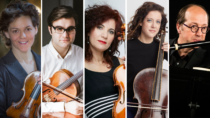
Accademia de’ Dissonanti
Accademia de’ Dissonanti was founded in 2020. As an ensemble and artistic institution, it presents concerts, publications, and educational academies centred on historical performance and creative research under the leadership of artistic director Elinor Frey. In the 2022-2023 season, Accademia de’ Dissonanti explores music by Jean Baur, Vivaldi, and others with the participation of specialists in historical performance. Following its January 2020 tour under the name of Elinor Frey and Friends, its October 2022 tour features “Boccheriniana” 2, a program dedicated to the charming and fascinating music of Luigi Boccherini in concert in Toronto, Montréal, Vancouver, Victoria, Kénogami, Waterloo, and Salt Spring Island. In Summer 2023, Accademia de’ Dissonanti will host “Early Cello Gathering”, an in-person master class academy dedicated to exploring the early Italian cello.
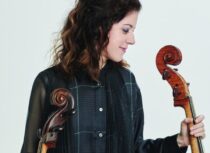
Elinor Frey, dir., cello
Elinor Frey is a leading Canadian-American cellist, gambist, and researcher. Her albums on the Belgian label Passacaille and Canadian label Analekta – many of which are world premiere recordings – are the fruit of long collaborations with artists such as Suzie LeBlanc, Marc Vanscheeuwijck, and Lorenzo Ghielmi, as well as with composers including Maxime McKinley, Linda Catlin Smith, Christian Mason, and Lisa Streich. Elinor’s recording of cello sonatas by Giuseppe Clemente Dall’Abaco received a Diapason d’Or and her critical editions of Dall’Abaco’s cello music is published in collaboration with Walhall Editions. Early Italian Cello Concertos, her album in collaboration with Rosa Barocca orchestra, won the 2023 JUNO Award for Classical Album of the Year (small ensemble).
Elinor is the artistic director of Accademia de’ Dissonanti, an organization for performance and research, and she has performed throughout the Americas and in Europe in recital and with numerous chamber ensembles and orchestras (Constantinople, Les idées heureuses, Il Gardellino, Tafelmusik, Pacific Baroque Orchestra, etc.). In March 2023, she performed Boccherini and Sammartini concertos with the Australian Brandenburg Orchestra.
Recipient of dozens of grants and prizes supporting performance and research, including the US-Italy Fulbright Fellowship (studying with Paolo Beschi in Como, Italy) and a recent research residency at the Orpheus Institute in Ghent, Elinor holds degrees from McGill, Mannes, and Juilliard. She teaches Baroque cello and performance practice at McGill University and the Université de Montréal and is a Visiting Fellow in Music (2020–2023) at Lady Margaret Hall, Oxford University. Frey was awarded Québec’s Opus Prize for “Performer of the Year” in 2021.
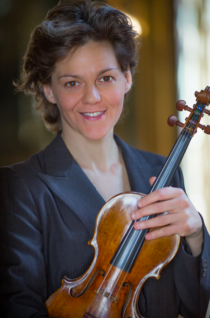
Laura Andriani, violin
Originally from Italy, Laura studied violin with Elena Guizzardi and Massimo Marin at the Giuseppe Verdi Conservatory of Music in Torino, where she graduated at the age of 17. She also studied with Corrado Romano, Franco Gulli, Adelina Oprean (obtaining the Solisten-Diplom at the Musik-Akademie in Basel, Switzerland) and Salvatore Accardo.
She Mastered in Chamber Music in England (Britten-Pears School in Aldeburgh and Royal Academy of Music in London) and Italy (Scuola di Musica di Fiesole) with members of the Amadeus Quartet, the Smetana Quartet and the Quartetto Italiano. Alongside her musical life, in 2005 she graduated in Humanities (Letters and Philosophy) with great distinction from the Università degli Studi in Turin.
After performing as First Violin of the Andriani Quartet, Laura became the first violin of the Alcan Quartet and moved to Quebec in 2003. The Alcan Quartet’s activity and discography (including works by Mendelssohn, Glenn Gould, MacMillan, and the Complete Beethoven’s Quartets) were highly successful in Canada and internationally.
As a chamber musician, Laura has performed in Europe (Italy, France, Germany, Austria, Spain, Belgium, Holland, England and Czech Republic), Canada, the United States, China and Korea.
She is an instructor in Baroque Violin and Ensembles at the Early Music Department at McGill University and she is a Guest Professor at the Université de Montréal; and she is the First Violin of the Isabel Quartet (Queen’s University, Ontario). One of her latest research projects highlights concerns with violin postures and the historical performance of Paganini Caprices.
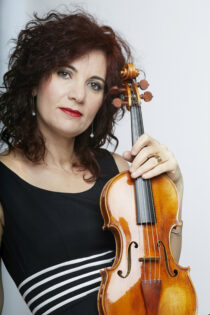
Rossella Croce, violin
Rossella Croce graduated with top marks in violin in 1998 at the Conservatory A. Pedrollo of Vicenza under the guidance F. Missaggia. During her studies she gained several scholarships and was finalist in various violin and chamber music competitions.She then specialized on the early violin repertoire at the Scuola Civica in Milan and at the Conservatory in Den Haag (Holland) with Enrico Gatti following at the same time also courses with R. Terakado, E. Wallfisch and others.
She has an intense concert activity which leads her to play in the most prestigious concert halls and theatres in the world. She works, also as first violin, with many important early music groups such as Zefiro, Ensemble Aurora, Accordone, La Risonanza, Il Gardellino, Seicento Stravagante, Accademia W. Hermans, Accademia Bizantina, Accademia Strumentale Italiana, Meranbaroque, etc.
She played in several broadcasts for RAI Radio 3, RSI, WDR, Radio France, etc. Rossella also recorded for the labels Sony Classics, Alpha, Brilliant, Cipress, Naive, Arcana, Glossa, Amadeus, Bottega Discantica, Classic Voice ,Eloquentia, etc. She has recently recorded the “Invenzioni a violino solo” op. X by Francesco Antonio Bonporti for La Bottega Discantica (Milan), The Art of Fugue by J.S. Bach and The Pieces of the Clavecin en Concerts by J.P. Rameau for Challenge Classics with Accademia Strumentale Italiana led by Alberto Rasi. She teaches at the Music School of The Music & Art Study Center in Florence.
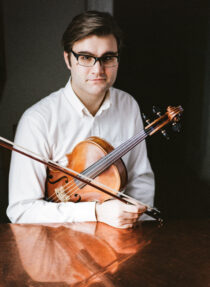
Isaac Chalk, viola
Canadian violist Isaac Chalk has received a rich musical training. In addition to his education as an instrumentalist, Mr. Chalk also worked extensively as a choral singer and attended the Maîtrise des Petits Chanteurs du Mont Royal in his earlier years. Mr. Chalk is a graduate of McGill University, where he was a recipient of many awards, including the Lloyd CarrHarris String Scholarship and the prestigious Golden Violin Award, the largest privately funded music scholarship in Canada. Mr. Chalk also holds a degree from the Mozarteum, in Salzburg. In February 2011, he had his Koerner Hall debut performing Béla Bartók’s Viola Concerto with the Royal Conservatory Orchestra conducted by Julian Kuerti.
Mr. Chalk was named Principal Viola of les Violons du Roy in June 2013 and since then has performed with the orchestra in their regular series in Quebec City and Montreal, at the Lanaudière Festival, at the Domaine Forget International Festival and on tour in Canada, the United States and Europe. Mr. Chalk recently had his début with the orchestra in Mozart’s Sinfonia Concertante. Mr. Chalk has been generously supported by the Sylva Gelber Music Foundation and the Canada Council for the Arts.
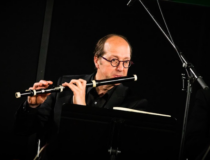
Jan de Winne, flute
Jan De Winne studied flute, chamber music and transverse flute at the conservatories of Gent and Brussels and graduated in musicology and art history at the University of Gent.
He completed his traverso studies with Barthold Kuijken. He was a finalist of the prestigious international early music competition in Bruges in 1987. He has been a member of the Collegium Vocale and the Orchestre des Champs-Elysées (PhilippeHerreweghe) for more than 15 years.
In 2004 he decided to concentrate his energy and enthusiasm into the organisation and development of his own ensemble il Gardellino, which he founded with Marcel Ponseele in 1988. As a member of il Gardellinoand as a soloist he has been performing in Europe, Asia, South and North America and he recorded over 60 CDs for Accent, Ricercar, Harmonia Mundi and Passacaille. His passion for period instruments led him to research early flutes and to make baroque and classical flutes since 1988.
Since 2006 he is the artistic director of the record label Passacaille. Jan De Winne teaches traverso at theConservatoire National Supérieur de Musique et Danceof Parisand leads the early music department of the Royal Conservatoryof Brussels (KCB).


